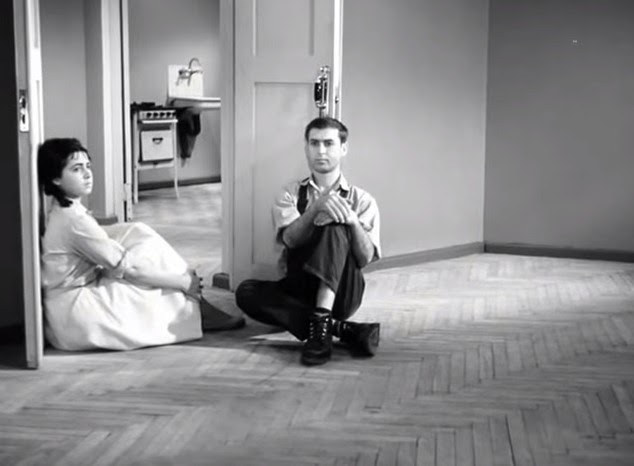
I wonder if Eula Bliss has seen this near-dialogue-free Soviet-era Georgian short? In Having and Being Had (a book I am admittedly yet to read), Bliss takes as her starting point the purchase of her house: “In 2014 she bought her first house, with her husband John. This should have made her happy; instead it made her uncomfortable in a way that she couldn’t describe.” (source) From the reviews and excerpts I have read, her concerns are given particular focus by the issue of furniture, its maintenance and longevity, its design and creation. Furniture is also at the heart of this unsubtle, cheeky little warning against the march of consumerism and, presumably, Western ideals of living.
A young couple wanders the streets of Tbilisi – they tease each other, they fall out, they make up. They search, endlessly, for a quiet place to share a kiss. Privacy is all they ask for. Meanwhile, those around them seem unconcerned with such things: the residents of an old building fling open the windows of their rooms and deliberately eschew privacy in favour of communal vivacity; playing music from their windows, watching the world while doing weights, practising ballet to the sounds of the musicians all around. This cheerful racket is only matched by the clatter of a gang of devious removal men (furniture sellers? Their actual jobs are unclear. They port furniture from place to place – loudly).
All the furniture goes out of the building and a new building appears, square and squat and regular. The locals move in and happily fling open the square, regular windows and carry on as they were. The young couple finds an empty apartment and finally they get to enjoy the privacy they sought, now with electricity, gas and running water! They have nothing else in the apartment and they are quite content with one another. Downstairs, one of the noisy furniture men moves his stock in and goes about from keyhole to keyhole, searching for customers. Having shown the young people the potential on offer – a life in old age, solemnly polishing the glassware together – and been rebuffed, he resorts to leaving a chair in their apartment. The chair sits like a dark stain in the bright, empty rooms, but its influence is immediate: item by item, the couple now buys into the life of consumerism.
Now that they have things, they must get locks on their door to protect the things. One thing begets another; outfits must change; plants in vases need water; furniture needs polishing; and why open a window when you can buy a fan? As the women in the building wave their dusters out of the windows, the musicians retreat indoors, their instruments coated in dust, the sounds of electrical equipment drowning them out. The man exercising at his window turns away from it and the ballet dancer gives up, unable to concentrate. The film’s scant dialogue bubbles up as the couple argue – earlier they spoke softly, inaudibly, when all they had to compete with was the music around them. Now all they can do is yell at one another – even the furniture man notices, and is surprised that their things have not made them happy.
Things break, and the couple struggle to connect as they move awkwardly around the crowded rooms. Happily, the usual Georgian reluctance to gather the narrative into an ending, or to articulate a clear message, is absent from this little film. With a clamour of noise, the couple fling their troublesome furniture from the window to the street. The musicians begin to play in joyful response, the ballet dancer resumes her practise and the weightlifter turns back to the window with a smile. The couple go to their window, they throw it open and beam at their happy neighbours. The furniture man and his friends shake their heads over the mess on the street, uncomprehending.
Up on the pasture, where the couple used to go to kiss before they found their apartment, there is a reminder that despite this about-turn in their priorities, the damage cannot entirely be undone: the tree they used to kiss beneath is gone, chopped down to make the furniture they demanded more and more of. It may not be subtle, but აპრილი [April] is a charming little comedy in the vein of works like The Plank (forgive me, my references for this time of film are still limited), summarising a place and a time with a few deftly drawn characters and locations. It is playful and romantic – the lights are kept on and the water is kept running by the strength of the couple’s love for one another – and you won’t be able to help smiling along with the musicians when they catch their opportunities to play in the moonlit night. The use of sound, particularly the squeaky shoes of the furniture man, disturbing the peace wherever he goes, is ingenious, and it’s all very beautiful to look at. Didn’t do much for my Georgian listening practise, but it was a delight.
Pingback: The Rise/Revenge/Return of ienthuse! | I enthuse